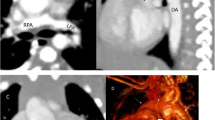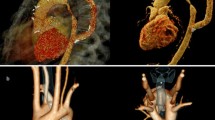Abstract
Congenital heart disease (CHD), including complex anomalies of the pulmonary arteries, are now earlier diagnosed and treated. Due to improvements in interventional and surgical therapy, the number of patients with the need for follow-up examinations is increasing. Pre- and postinterventional imaging should be done as gently as possible, avoiding invasive techniques if possible. With the technical improvement of multidetector-row computed tomography (MDCT) and magnetic resonance imaging (MRI), both techniques are increasingly used for noninvasive assessment of the pulmonary vasculature in children with CHD. Knowledge of the most common diseases affecting the pulmonary vasculature and the kind of surgical and interventional procedures is essential for optimal imaging planning. This is especially important because interventions can be positively influenced by high-quality imaging. Therefore, the most common diseases and procedures are described and imaging modality of choice and important image findings are discussed.









Similar content being viewed by others
References
Hoffman JI (1995) Incidence of congenital heart disease: II. Prenatal incidence. Pediatr Cardiol 16:155–165
Bernstein D (2004) Congenital heart disease nelson textbook of pediatrics, pp 1499–1554
Perloff JK (1991) Congenital heart disease in adults. A new cardiovascular subspecialty. Circulation 84:1881–1890
Eichhorn J, Fink C, Delorme S, Ulmer H (2004) Rings, slings and other vascular abnormalities. Ultrafast computed tomography and magnetic resonance angiography in pediatric cardiology. Z Kardiol 93:201–208
Maintz D, Juergens KU, Wichter T, Grude M, Heindel W, Fischbach R (2003) Imaging of coronary artery stents using multislice computed tomography:in vitro evaluation. Eur Radiol 13:830–835
Goo HW, Park IS, Ko JK, Kim YH, Seo DM, Yun TJ, Park JJ, Yoon CH (2003) CT of congenital heart disease:normal anatomy and typical pathologic conditions. Radiographics 23(Spec No):S147–S165
Keats TE, Sistrom C (2001) Atlas of radiologic measurement
Long FR, Castile RG, Brody AS, Hogan MJ, Flucke RL, Filbrun DA, McCoy KS (1999) Lungs in infants and young children:improved thin-section CT with a noninvasive controlled-ventilation technique-initial experience. Radiology 212:588–593
Raman SV, Cook SC, McCarthy B, Ferketich AK (2005) Usefulness of multidetector row computed tomography to quantify right ventricular size and function in adults with either tetralogy of Fallot or transposition of the great arteries. Am J Cardiol 95:683–686
Greuter M, Lips J, van Ooijen P, Oudkerk M (2005) Comparative study of coronary motion artefacts in four multidetector ECG -gated computed tomography units with an anthropomorphic moving heart phantom. Eur Radiol 15:E3
Eichhorn JG, Fink C, Long F, Arnold R, Ley S, Ulmer H, Kauczor HU (2005) [Multidetector CT of Congenital Vascular Anomalies and Associated Complications in Newborns and Infants.]. Fortschr Röntgenstr 177:1366–1372
Fiore AC, Brown JW, Weber TR, Turrentine MW (2005) Surgical treatment of pulmonary artery sling and tracheal stenosis. Ann Thorac Surg 79:38–46; discussion 38–46
Murai S, Hamada S, Yamamoto S, Khankan AA, Sumikawa H, Inoue A, Tsubamoto M, Honda O, Tomiyama N, Johkoh T, Nakamura H (2004) Evaluation of major aortopulmonary collateral arteries (MAPCAs) using three-dimensional CT angiography:two case reports. Radiat Med 22:186–189
Lee EY, Siegel MJ, Hildebolt CF, Gutierrez FR, Bhalla S, Fallah JH (2004) MDCT evaluation of thoracic aortic anomalies in pediatric patients and young adults:comparison of axial, multiplanar, and 3D images. AJR Am J Roentgenol 182:777–784
Vock P (2005) CT dose reduction in children. Eur Radiol 15:2330–2340
Eichhorn J, Long FR, Hill SL, O’Donovan J, Chisolm JL, Fernandez SA (2006) Assessment of in-stent stenosis in small children with congenital heart disease using multi-detector computed tomography: a validation study. Catheter Cardio Interv 64 (in press)
Bacher K, Bogaert E, Lapere R, De Wolf D, Thierens H (2005) Patient-specific dose and radiation risk estimation in pediatric cardiac catheterization. Circulation 111:83–89
Naganawa S, Kawai H, Fukatsu H, Ishigaki T, Komada T, Maruyama K, Takizawa O (2004) High-speed imaging at 3 Tesla:a technical and clinical review with an emphasis on whole-brain 3D imaging. Magn Reson Med Sci 3:177–187
Gilmore JH, Zhai G, Wilber K, Smith JK, Lin W, Gerig G (2004) 3 Tesla magnetic resonance imaging of the brain in newborns. Psychiatry Res 132:81–85
Weiss F, Habermann CR, Lilje C, Nimz M, Rasek V, Dallmeyer J, Stork A, Graessner J, Weil J, Adam G (2005) [MRI of pulmonary arteries in follow-up after Arterial-Switch-Operation (ASO) for transposition of great arteries (d-TGA).]. Fortschr Röntgenstr 177:849–855
Holmqvist C, Hochbergs P, Bjorkhem G, Brockstedt S, Laurin S (2001) Pre-operative evaluation with MR in tetralogy of fallot and pulmonary atresia with ventricular septal defect. Acta Radiol 42:63–69
Fink C, Eichhorn J, Kiessling F, Bock M, Delorme S (2003) [Time-resolved multiphasic 3D MR angiography in the diagnosis of the pulmonary vascular system in children]. Fortschr Röntgenstr 175:929–935
Macgowan CK, Al-Kwifi O, Varodayan F, Yoo SJ, Wright GA, Kellenberger CJ (2005) Optimization of 3D contrast-enhanced pulmonary magnetic resonance angiography in pediatric patients with congenital heart disease. Magn Reson Med 54:207–212
Fries P, Altmeyer K, Seidel R, Massmann A, Kirchin MA, Schneider G (2005) Dynamic contrast enhanced MRA in pediatric patients after application of Gd-BOPTA. Eur Radiol 15:E8
Grist TM, Thornton FJ (2005) Magnetic resonance angiography in children:technique, indications, and imaging findings. Pediatr Radiol 35:26–39
Boll DT, Lewin JS, Young P, Siwik ES, Gilkeson RC (2005) Perfusion abnormalities in congenital and neoplastic pulmonary disease:comparison of MR perfusion and multislice CT imaging. Eur Radiol 15:1978–1986
Ley S, Fink C, Zaporozhan J, Borst MM, Meyer FJ, Puderbach M, Eichinger M, Plathow C, Grunig E, Kreitner KF, Kauczor HU (2005) Value of high spatial and high temporal resolution magnetic resonance angiography for differentiation between idiopathic and thromboembolic pulmonary hypertension:initial results. Eur Radiol 15:2256–2263
Biederer J, Both M, Graessner J, Liess C, Jakob P, Reuter M, Heller M (2003) Lung morphology: fast MR imaging assessment with a volumetric interpolated breath-hold technique:initial experience with patients. Radiology 226:242–249
Jhooti P, Gatehouse PD, Keegan J, Bunce NH, Taylor AM, Firmin DN (2000) Phase ordering with automatic window selection (PAWS):a novel motion-resistant technique for 3D coronary imaging. Magn Reson Med 43:470–480
Sorensen TS, Korperich H, Greil GF, Eichhorn J, Barth P, Meyer H, Pedersen EM, Beerbaum P (2004) Operator-independent isotropic three-dimensional magnetic resonance imaging for morphology in congenital heart disease:a validation study. Circulation 110:163–169
Sorensen TS, Beerbaum P, Korperich H, Pedersen EM (2005) Three-dimensional, isotropic MRI:a unified approach to quantification and visualization in congenital heart disease. Int J Cardiovasc Imaging 21:283–292
Greil GF, Kramer U, Dammann F, Schick F, Miller S, Claussen CD, Sieverding L (2005) Diagnosis of vascular rings and slings using an interleaved 3D double-slab FISP MR angiography technique. Pediatr Radiol 35:396–401
Boechat MI, Ratib O, Williams PL, Gomes AS, Child JS, Allada V (2005) Cardiac MR imaging and MR angiography for assessment of complex tetralogy of Fallot and pulmonary atresia. Radiographics 25:1535–1546
Roman KS, Kellenberger CJ, Farooq S, MacGowan CK, Gilday DL, Yoo SJ (2005) Comparative imaging of differential pulmonary blood flow in patients with congenital heart disease: magnetic resonance imaging versus lung perfusion scintigraphy. Pediatr Radiol 35:295–301
Gatehouse PD, Keegan J, Crowe LA, Masood S, Mohiaddin RH, Kreitner KF, Firmin DN (2005) Applications of phase-contrast flow and velocity imaging in cardiovascular MRI. Eur Radiol 15:2172–2184
Varaprasathan GA, Araoz PA, Higgins CB, Reddy GP (2002) Quantification of flow dynamics in congenital heart disease:applications of velocity-encoded cine MR imaging. Radiographics 22:895–905; discussion 905–896
Nakanishi T (2005) Cardiac catheterization is necessary before bidirectional Glenn and Fontan procedures in single ventricle physiology. Pediatr Cardiol 26:159–161
Sequeiros RB, Ojala R, Kariniemi J, Perala J, Niinimaki J, Reinikainen H, Tervonen O (2005) MR-guided interventional procedures: a review. Acta Radiol 46:576–586
Bock M, Umathum R, Zuehlsdorff S, Volz S, Fink C, Hallscheidt P, Zimmermann H, Nitz W, Semmler W (2006) Interventional magnetic resonance imaging:an alternative to image guidance with ionising radiation. Radiat Prot Dosimetry 117:74–78
Rickers C, Seethamraju RT, Jerosch-Herold M, Wilke NM (2003) Magnetic resonance imaging guided cardiovascular interventions in congenital heart diseases. J Interv Cardiol 16:143–147
Krueger JJ, Ewert P, Yilmaz S, Gelernter D, Peters B, Pietzner K, Bornstedt A, Schnackenburg B, Abdul-Khaliq H, Fleck E, Nagel E, Berger F, Kuehne T (2006) Magnetic resonance imaging-guided balloon angioplasty of coarctation of the aorta: a pilot study. Circulation 113:1093–1100
Bhat AH, Sahn DJ (2004) Congenital heart disease never goes away, even when it has been ‘reate’:the adult with congenital heart disease. Curr Opin Pediatr 16:500–507
Blalock A, Taussig HB (1945) The surgical treatment of malformations of the heart in which there is pulmonary stenosis or pulmonary atresia. JAMA 128:189–202
Duncan BW, Mee RB, Prieto LR, Rosenthal GL, Mesia CI, Qureshi A, Tucker OP, Rhodes JF, Latson LA (2003) Staged repair of tetralogy of Fallot with pulmonary atresia and major aortopulmonary collateral arteries. J Thorac Cardiovasc Surg 126:694–702
Konen E, Raviv-Zilka L, Cohen RA, Epelman M, Boger-Megiddo I, Bar-Ziv J, Hegesh J, Ofer A, Konen O, Katz M, Gayer G, Rozenman J (2003) Congenital pulmonary venolobar syndrome:spectrum of helical CT findings with emphasis on computerized reformatting. Radiographics 23:1175–1184
Tchervenkov CI, Chedrawy EG, Korkola SJ (2002) Fontan operation for patients with severe distal pulmonary artery stenosis, atresia, or a single lung. Semin Thorac Cardiovasc Surg Pediatr Card Surg Annu 5:68–75
Gewillig M (2005) The Fontan circulation. Heart 91:839–846
Jacobs ML, Pourmoghadam KK (2003) The hemi-Fontan operation. Semin Thorac Cardiovasc Surg Pediatr Card Surg Annu 6:90–97
Ohye RG, Bove EL (2001) Advances in congenital heart surgery. Curr Opin Pediatr 13:473–481
Jatene AD, Fontes VF, Paulista PP, Souza LC, Neger F, Galantier M, Sousa JE (1976) Anatomic correction of transposition of the great vessels. J Thorac Cardiovasc Surg 72:364–370
Losay J, Touchot A, Serraf A, Litvinova A, Lambert V, Piot JD, Lacour-Gayet F, Capderou A, Planche C (2001) Late outcome after arterial switch operation for transposition of the great arteries. Circulation 104:I121–126
Gutberlet M, Boeckel T, Hosten N, Vogel M, Kuhne T, Oellinger H, Ehrenstein T, Venz S, Hetzer R, Bein G, Felix R (2000) Arterial switch procedure for D-transposition of the great arteries:quantitative midterm evaluation of hemodynamic changes with cine MR imaging and phase-shift velocity mapping-initial experience. Radiology 214:467–475
Author information
Authors and Affiliations
Corresponding author
Rights and permissions
About this article
Cite this article
Ley, S., Zaporozhan, J., Arnold, R. et al. Preoperative assessment and follow-up of congenital abnormalities of the pulmonary arteries using CT and MRI. Eur Radiol 17, 151–162 (2007). https://doi.org/10.1007/s00330-006-0300-8
Received:
Revised:
Accepted:
Published:
Issue Date:
DOI: https://doi.org/10.1007/s00330-006-0300-8




